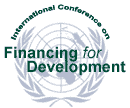
Department of Public Information - News and Media Services Division - New York
18-22 March 2002
17 March 2002
 |
International
Conference on Financing for Development Department of Public Information - News and Media Services Division - New York |
|
| Monterrey, NL, Mexico 18-22 March 2002 |
17 March 2002 |
|
PRE-CONFERENCE PRESS BRIEFING
After weeks of intensive negotiating, countries had reached agreement on a wide range of issues that put development at the centre of global financial reforms and paved the way for the International Conference on Financing for Development, Nitin Desai, Under-Secretary-General for Economic and Social Affairs, said at a press conference this afternoon.
The press conference, in advance of tomorrow´s opening of the international Conference in Monterrey, Mexico, was also addressed by the co-Chairs of the Preparatory Committee, Ambassador Shamshad Ahmad (Pakistan) and Ambassador Ruth Jacoby (Sweden). Also present was the Executive Coordinator of the Financing for Development process, Oscar de Rojas (Mexico).
They emphasized that Monterrey was not to be viewed as a stand-alone event, but the first building block in a long and continuing process.
Asked his opinion of the key achievements of the Monterrey Consensus, Mr. Desai said the most important was the inclusion of language recognizing that official development assistance must be increased. The only remaining questions on that matter were by how much and by whom. Other key achievements included recognition of the need for managed debt relief, for raising the voice of developing countries, and for eliminating corruption.
Ms. Jacoby pointed out that official development assistance was one of the key elements of development. A few countries in Europe had endeavoured to meet the 0.7 per cent gross domestic product (GDP) target set for the developed countries. Some countries had already promised to increase their contribution.
She emphasized that Monterrey was not just another United Nations conference. It would be a very high-level event that included the world's major economic and financial actors and institutions. The event was not only about aid, but also about ensuring the entire international economic system functioned properly in eliminating debt, and building the capacity of developing countries to benefit from growing trade.
Mr. Ahmad added that Monterrey was a blueprint for joint efforts on the part of the developing and developed countries in pursuing development in a holistic manner.
Asked about demands in the United States for an end to corruption, Mr. Ahmad replied that the South had recognized the need for good governance and the rule of law. However, elements in the developed countries encouraged corruption by paying kickbacks. It was not a simple matter, he added.
Ms. Jacoby said that the mere fact that discussion of corruption had increased over the last decade or so was in itself a sign of progress. Previously, there had been a reluctance to mention corruption for fear of giving offence.
What had ended that taboo? the same correspondent asked.
Mr. Desai replied that there was no question of a taboo. It was the people of the country concerned who paid the price of corrupt practices. He stressed that the consensus document raised the question of repatriation of corruptly acquired funds.
Asked about the risk of violence by elements of civil society if no changes were made to the outcome document, Mr. Ahmad said that no violence was anticipated. Non-governmental organizations (NGOs) had been on board throughout the preparatory process and had not been alienated. However, if they did raise angry voices, they must be heard, as they were part of the globalizing world.
Mr. Desai pointed out that NGOs would be participating in the Conference, including the Summit, where they could address heads of State.
Answering a question about support for the consensus by multinational corporations, Mr. Ahmad said the aggrandizement of corporate wealth at the expense of the world's poor was a very serious issue. Pharmaceutical companies were profiting from disease and death. They must spend some of the vast wealth they accumulated on HIV/AIDS research, education and other issues.
He added that three quarters of global wealth was in the hands of one quarter or the world´s population. Transnational corporations were playing a huge role in helping to accumulate that wealth. It was only just and appropriate to require that they enhance the fight against poverty by returning part of that wealth to the countries where they had their biggest operations.
Press Conferences
Conference News